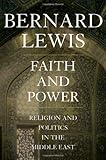 In this week’s New York Times Sunday Book Review, Max Rodenbeck has an essay on two recent books on Islam: Faith and Power: Religion and Politics in the Middle East, by Bernard Lewis, and Muhammad and the Believers: At the Origins of Islam, by Fred M. Donner.
In this week’s New York Times Sunday Book Review, Max Rodenbeck has an essay on two recent books on Islam: Faith and Power: Religion and Politics in the Middle East, by Bernard Lewis, and Muhammad and the Believers: At the Origins of Islam, by Fred M. Donner.
Rodenbeck suggests that these two works, though both published quite recently, are representative of two very different approaches to the history of Islam. Lewis, who is known to many of us younger scholars of religion as the chief interlocutor of Edward Said, betrays his age (and politics) in his not-so-subtly false statements about the history of the state of Israel, for instance, whereas Donner is far more nuanced, and successfully de-links political formations and theology. As Rodenbeck writes:
This more sophisticated reading of history explains Islam not as a static doctrine, but as one that evolved from an ecumenical, syncretic, pietist and millenarian cult into a more dogmatic and exclusivist faith. In contrast to Lewis, who depicts Islam as aggressive from the start, Donner shows that contemporary followers of other religions initially, and perhaps even for several generations, regarded Islam as an open-minded and not specially threatening movement with universalist aspirations. A Nestorian Christian patriarch writing to a bishop in A.D. 647 testified not only that his new Muslim rulers were peaceable, but also that they honored priests and bestowed monasteries with gifts. An Armenian bishop recorded around A.D. 660 that the first governor of Muslim Jerusalem was Jewish.
Read the full essay here.













